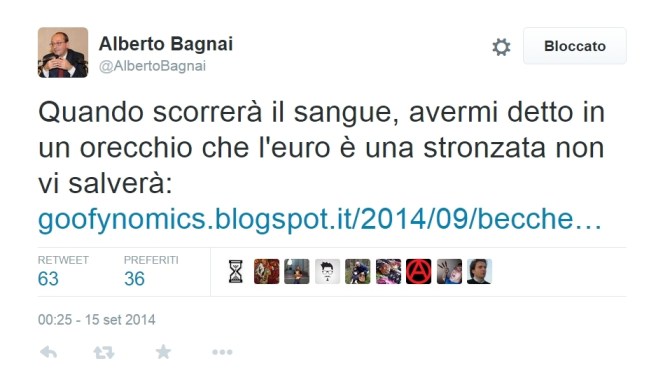Let me try and take Italexit, i.e. the exit of Italy from the Eurozone, seriously. How could an euroskeptical Italian government accomplish it? A referendum on the permanence of Italy in the eurozone is at the same time unconstitutional (the Italian Constitution forbids referenda on international treaties) and completely stupid from an economic viewpoint.

Why? A high enough probability of an antieuro outcome in the popular vote would immediately trigger a bank run from Italian banks, since firms and citizens would not want to be left with bank accounts that are then devalued once the new Italian currency replaces the euro: a financial tragedy that any decent undergraduate student in economics could predict and would want to avoid.
Then, the only sensible way for a country like Italy to exit the Eurozone is to do it in an “unexpected way”, by decree, during a (long) weekend. In Italy, the party that is more favorable to eurexit is Salvini’s League, even if eurexit was not part of the coalition manifesto with Forza Italia during the last general elections and of the current government’s contract (“contratto di governo”) with the Five Star Movement. Still, Salvini’s League does face a tricky strategic puzzle if in the next general elections it will still be favorable to eurexit.
To put it shortly: if voters and investors on average think that a vote for Salvini’s League in the next elections is a vote to implement eurexit, then the vote itself becomes an eurexit referendum. A high probability to the event that the League wins the elections would translate in bank runs and an exploding spread on Italian bonds, with a mechanism that mimicks the referendum case discussed above. The reason is that (rational) savers and investors are likely to act immediately, and contagion might affect not-so-rational savers as well.
Thus Salvini might want to avoid this mechanism to take place, by declaring during the electoral campaign that the League’s manifesto does not include eurexit. Would you believe him? Is he credible? He might want to fool voters, exactly in order to avoid to trigger the quasi-referendum mechanism highlighted above.
But there is no credible commitment to avoiding a surprise eurexit, since this is what Salvini’s economic advisors, i.e. MP Claudio Borghi and Senator Alberto Bagnai, have proposed so many times in the past. The citizen-candidate model by Besley and Coate applies: candidates cannot credibly commit to implement what they dislike personally, or what their advisors fiercely hate.
Bottom line: the influence of anti-euro economic advisors Borghi and Bagnai within the League will be priced accordingly by investors and rational savers, turning the next general elections into an eurexit referendum.
Under these conditions a promise not to exit the euro by Salvini IS NOT CREDIBLE.
PS: here are some lovely and politically correct tweets from Borghi and Bagnai.


